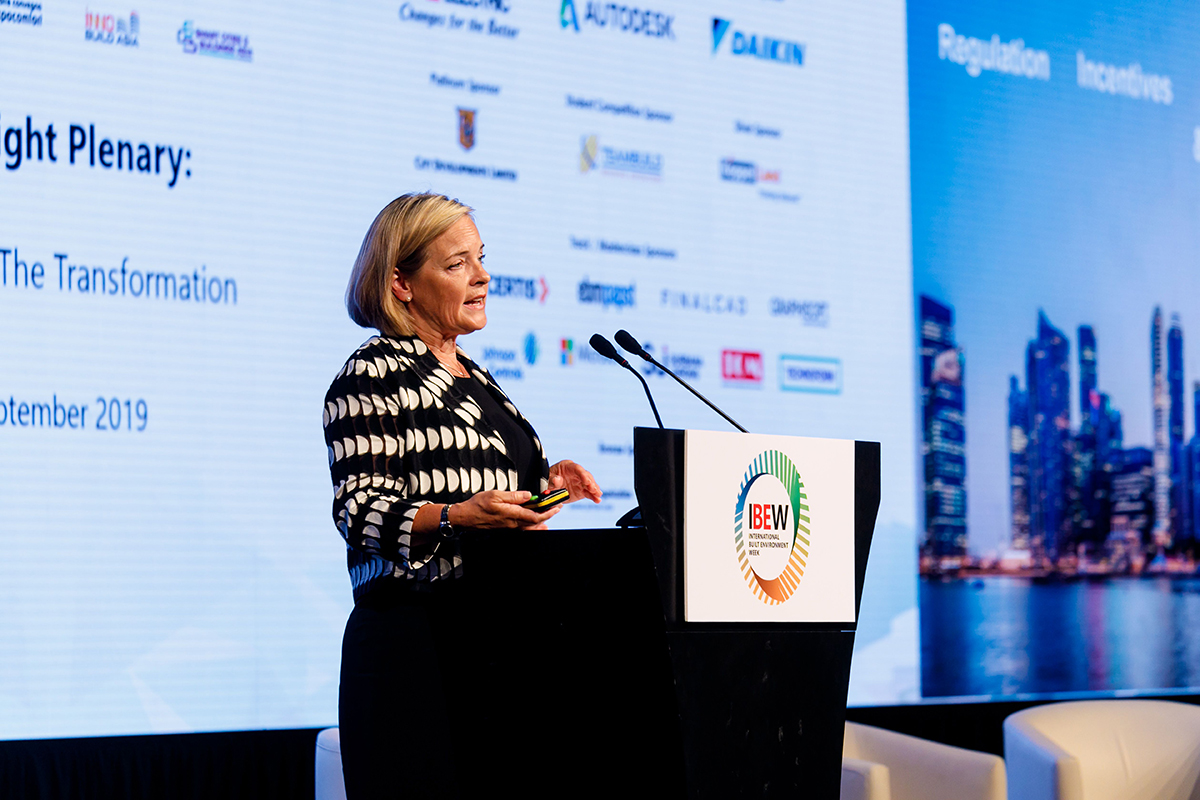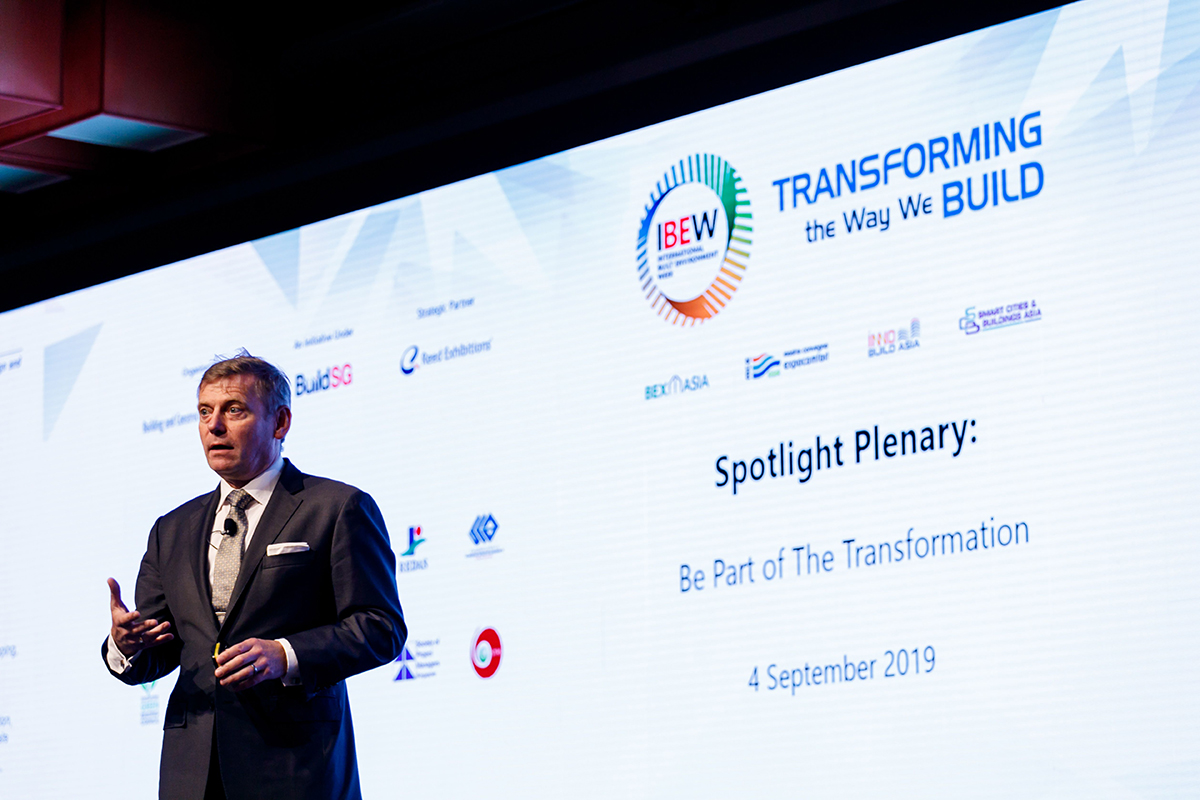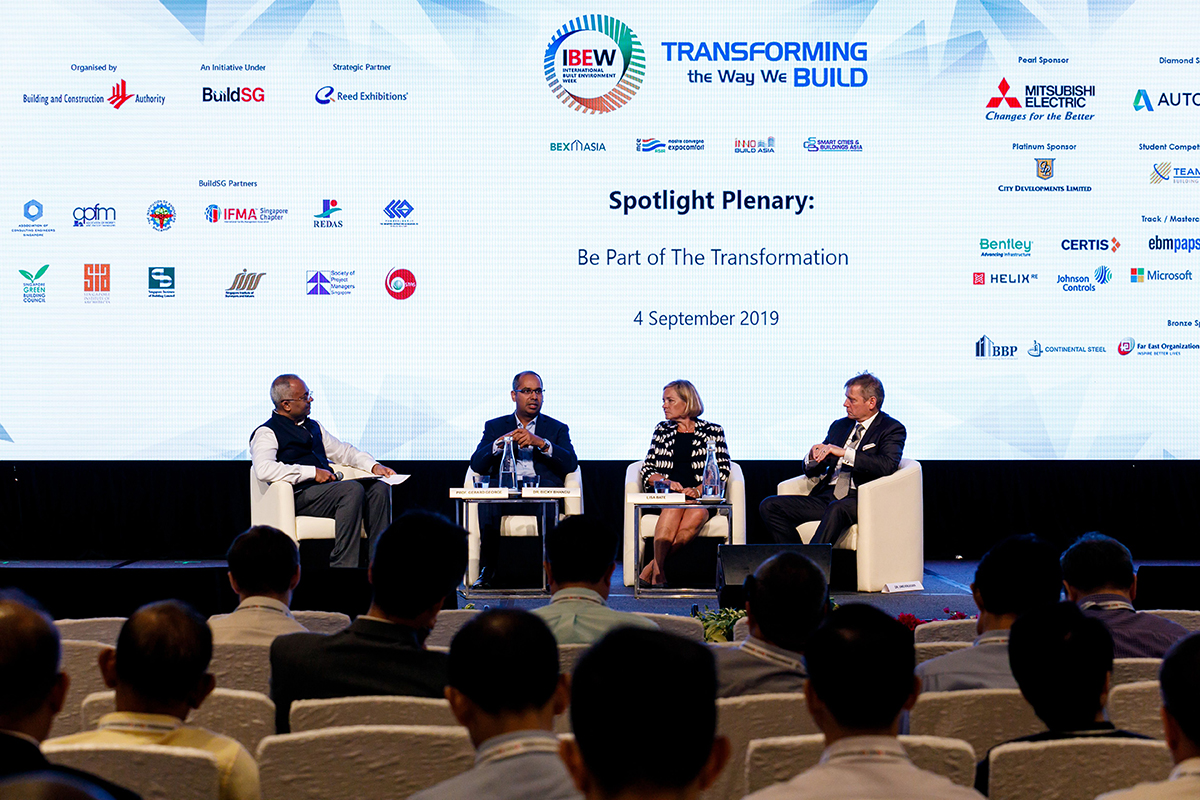Climate change, digitalisation of technologies and material innovation are here to stay. The future of the industry – as well as the companies themselves – depends on its ability to make the necessary transformation.
Three industrial luminaries, representing the perspectives of industry, policy and private investment, gave their take on the future of the built environment industry at the International Built Environment Week (IBEW) spotlight plenary sessions – a future where technology and human ingenuity has mitigated climate change and transformed our physical landscape.
Rolls Royce – Driving transformation
Long regarded as an engineering titan in the aerospace industry, Rolls Royce has taken the lead to identify the challenges and opportunities of the world to come. According to Dr Bicky Bhangu, President of SE Asia, Pacific & South Korea region for Rolls Royce Singapore, the company has set for itself ambitious environmental targets: zero waste to landfill by 2020, 50% reduction of energy consumption by 2025, and zero greenhouse gas emission from its manufacturing facilities by 2030.
Rolls Royce is putting money where their mouth is. Over two-thirds of its investment is directed at lowering environmental impact. This include outfitting its facility of the future with smart manufacturing technologies such as intelligent robotics systems and central data management. Many of these projects are the brainchild of Rolls Royce’s close collaboration with international research partners such as Harvard University as well as local institutes like A*STAR and Nanyang Technological University (NTU).
The intended results? Fuel-efficient engines that will generate less noise and waste pollution in cities. Digitisation of manufacturing operations from start to finish that will reduce waste and boost efficiency. The use of intelligent robots in engine maintenance that can enhance air safety and reliability.
Taken together, Rolls Royce’s drive towards innovation stands as proof of its commitment to the environment and the future.
|
|
 Ms Lisa Bate, Chair of World Green Building Council shared how innovation in technology and new ways of working can create a sustainable and resilient built environment. Ms Lisa Bate, Chair of World Green Building Council shared how innovation in technology and new ways of working can create a sustainable and resilient built environment.
|
|
World Green Building Council – Tackling climate change
The statistics are sobering. Buildings are responsible for 39% of the world’s carbon emissions and 50% of global material use. By 2050, world global population will jump by 27% to 9.8 billion. Global demand for floor area will increase by 100%. Energy demand will surge by 50%.
The obvious solution is green buildings.
Walking the talk, the World Green Building Council has committed itself to climate action. Taking on the monumental task of delivering global goals is its network of 70 local Green Building Councils. Their target is clear – arresting the rise in global temperature by getting the built environment sector to commit to zero carbon emissions.
To do so, Ms Lisa Bate, Chair of the World Green Building Council, urged industry players to innovate and create new models of working. These include putting sustainability at the heart of their business, embracing circular economy principles where resources are not wasted, and recognising that green buildings can improve people’s health and well-being.
While the task itself is ambitious, she emphasised that the key lies in people, and the actions they take in order to effect policies, utilise technology and find solutions.
|
|
 Dr Uwe Krueger of Temasek International talked about how disruptive technology has enabled the rise of new and innovative business models in the construction industry. Dr Uwe Krueger of Temasek International talked about how disruptive technology has enabled the rise of new and innovative business models in the construction industry.
|
|
Temasek International – Disrupting the industry
Rounding it up was Temasek International’s vision of the future of built environment. As Dr Uwe Krueger, Senior Managing Director of Temasek International Pte Ltd; also Head (Industrials, Business Services, Energy & Resources) and Joint Head, Portfolio Management Group, pointed out, despite being worth US$9.5 trillion globally, the built environment industry is still a laggard in innovation, environment, performance and productivity.
His data paints a sobering picture. The construction sector spends less than 1% on R&D and IT but generates nearly 40% of global CO2 while consuming 36% of global energy resources. Over 90% of construction megaprojects fail, while labour productivity has stubbornly stayed at 1% for 20 years.
However, like many other industries, disruptive technologies and new business models are entering the space. Space-for-service companies AirBnB and WeWork are challenging traditional notions of housing and work. Digital technology is now used to map entire cities. Smart construction materials and reconfigurable spaces have rendered buildings environmentally-responsive and impermanent.
As a result, the construction sector has seen an explosion in the number of start-ups and capital investment. Digital technology and innovation may thus prove to be the catalyst needed to push an intransigent industry away from the traditional ways of working.
Conclusion
The plenary speakers’ message at IBEW is clear: climate change, digitalisation of technologies and material innovation are here to stay. It is a delicate time for the built environment sector as it balances itself on the cusp of change. The future of the industry – as well as the companies themselves – depends on its ability to make the necessary transformation.
|
|
 Moderated by Prof Gerard George, Dean of Lee Kong Chian School of Business, Singapore Management University, and Lee Kong Chian Chair Professor of Innovation and Entrepreneurship. The three guest speakers shared their views on how digitalisation and technological innovation are changing the built environment industry to be more sustainable, productive and smart. Moderated by Prof Gerard George, Dean of Lee Kong Chian School of Business, Singapore Management University, and Lee Kong Chian Chair Professor of Innovation and Entrepreneurship. The three guest speakers shared their views on how digitalisation and technological innovation are changing the built environment industry to be more sustainable, productive and smart.
|
|
About the speaker
Dr Bicky Bhangu, President – SE Asia, Pacific & South Korea, Rolls Royce Pte Ltd, Ms Lisa Bate, Chair of World Green Building Council and Dr Uwe Krueger, Senior Managing Director of Temasek International Pte Ltd; also Head (Industrials, Business Services, Energy & Resources) and Joint Head, Portfolio Management Group were invited as guest speakers at the IBEW spotlight plenary session on 4 September 2019.
About International Built Environment Week
The IBEW is the first fully integrated event in Asia Pacific that covers the entire built environment life cycle and value chain. Organised by the Building and Construction Authority together with Reed Exhibitions and supported by 12 Trade Associations and Chambers, the event offers the perfect platform for industry leaders and professionals from the global built environment to exchange ideas and experiences, widen networks and discover new business opportunities.
The inaugural IBEW was held from 3 to 6 September 2019 at Sands Expo & Convention Centre, Singapore. Themed ‘Transforming the Way We Build’, the event showcased today’s best practices and tomorrow’s innovations in the areas of environmental sustainability, construction productivity, digitalisation and smart facilities management.
Key highlights included a three-day International Built Environment Conference, specially-curated tours to some of the best-in-class projects in Singapore, four co-located trade shows, networking events and student engagement programmes. IBEW 2019 also featured special events such as the Breakfast Talk for CEOs, an exclusive forum for C-suite executives from the built environment; and BE Connect, an international business-matching platform for buyers and investors from the region to network and engage with top urban solutions providers equipped to meet their interests.
The second edition of IBEW will be held from 1 to 4 September 2020. For more updates on IBEW 2020, visit www.ibew.sg.